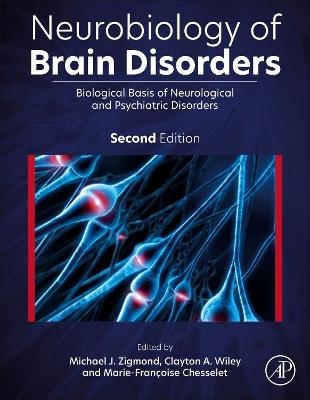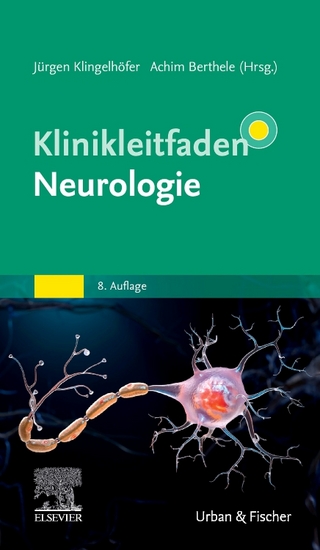
Neurobiology of Brain Disorders
Academic Press Inc (Verlag)
978-0-323-85654-6 (ISBN)
Organized by individual disorder, each chapter includes coverage of the clinical condition, diagnosis, treatment, underlying mechanisms, relevant basic and translational research, and key unanswered questions. This volume reflects progress in the field since publication of the first edition, with fully updated chapters, and new chapters on isolation, aging, global diseases, vascular diseases, and toxic/metabolic disease. New disorder coverage includes fibromyalgia, chronic fatigue, Restless Legs Syndrome, myasthenia gravis, and more.
Affiliation: Professor of Neurology, Department of Neurology, University of Pittsburgh, Pennsylvania, U.S.A Over the past year, Dr. Zigmond and his research team have continued their studies of cellular and animal models to examine Parkinson's disease (PD), which they believe is a multi-factorial disorder. A major focus of the lab is the role of intracellular signaling cascades in determining the viability of dopamine (DA) neurons. They hypothesize, for example, that trophic factors such as GDNF and oxidative stress can both stimulate intracellular survival cascades, including those involving MAP kinases. They further believe that endogenous trophic factor expression can be enhanced by exercise which in turn can be neuroprotective. And they have evidence that protection also can derive from acute exposure to low levels of a neurotoxin, a form of preconditioning. Last year their work included studies of the impact of oxidative stress induced by 6-hydroxydopamine (6-OHDA), a DA analogue that is concentrated in DA cells and rapidly breaks down to form reactive oxygen species. Results from these and other studies suggest that DA neurons react to stress by initiating a set of protective responses. Learning more about these responses may provide insights into new treatment modalities for PD. In the coming year, Dr. Zigmond will continue to focus on understanding the strategies DA neurons use to reduce their vulnerability to intracellular stress. For example, studies are underway to determine if inhibition of trophic actor action or of kinase activation will block neuroprotection seen with exercise or GDNF or increase 6-OHDA toxicity. Some of these studies involve the preparation of molecular biological tools that maintain kinases in a constitutively or dominant negative state and/or localize a kinase to the cytoplasm or the nucleus. In addition, histochemical methods are being developed to quantify kinase levels in different cellular compartments of identified cells. Dr. Wiley completed his undergraduate training at the University of Chicago (1976) and his MD/PhD training in Neurosciences at the University of California San Diego (1981). This was followed by Anatomical Pathology residency at University of California San Francisco, where he participated in the first autopsies performed on what later became known as AIDS. Returning to UCSD, he completed his Neuropathology fellowship and began a lifelong career studying the pathogenesis of viral infections of the nervous system. In 1985 Dr. Wiley was appointed Assistant Professor of Pathology at UCSD. He advanced to the rank of full professor before being recruited to the University of Pittsburgh Medical Center as Director of the Division of Neuropathology and its fellowship program in 1993. Dr. Wiley has maintained an active NIH funded research program investigating the pathogenesis of viral mediated neurodegeneration. During his career he has participated in the discovery of 4 emergent viral infections of the CNS (HIV, WNV, Zika, Human Parechovirus 3). Dr. Wiley has published over 250 peer-reviewed publications and was elected a Fellow of the American Association for the Advancement of Science in 1997. Currently his research is focused on the role of innate and adaptive immunity in protecting the brain from viral infections. Throughout his professional career, Dr. Wiley has been actively involved in educating physician scientists at both pre- and postgraduate stages. From 1997 to 2012 he served as Director of the Pittsburgh Medical Scientist Training Program and Associate Dean in the University of Pittsburgh School of Medicine. During this time he was actively involved in the National Association of MD/PhD Programs and the MD/PhD Section of the GREAT group in the AAMC where he served as President and Chair respectively. He also served on the AAMC Council of Academic Societies Task Force on Dual Degree Programs. After receiving her M.D. and Ph.D. degrees in Paris, France, she held research positions in France and faculty positions at the Medical College of Pennsylvania and the University of Pennsylvania, before joining UCLA in 1996. At UCLA, Dr. Chesselet chaired the Department of Neurobiology from 2002 to 2013 and was Interim Chair of the Department of Neurology (2015-2016). At UCLA, she created the Center for the Study of Parkinson’s Disease and directed the NINDS-funded UCLA Udall Center for Parkinson’s disease research, the NIEHS-funded UCLA Center for Gene Environment in Parkinson’s Disease, and the UCLA Advanced Center for Parkinson’s Disease Research of the American Parkinson Disease Association (APDA). Dr. Chesselet has directed graduate programs at the University of Pennsylvania and UCLA and the NINDS-funded Training Program in Neural Repair from 1998 to 2014. Until her retirement in 2016, her laboratory conducted research on the molecular mechanisms of disorders of the basal ganglia and new treatments for Parkinson’s and Huntington’s diseases. Her work has been extensively supported by the NIH, the Department of Defense, the Michael J. Fox Foundation, Cure HD Initiative, the California Institute for Regenerative Medicine, and several biopharmaceutical companies. She has served on the National Advisory Environmental Health Sciences Council, on Science Advisory Boards of the Hereditary Disease Foundation, the APDA, the Restless Leg Syndrome Foundation, the Michael J. Fox Foundation, as a member of the Scientific Committees for the NIH, the French National Research Agency, Canadian Weston Brain Institute, Canadian Vanier Fellowships, and the Italian Telethon, and consults for several biotech companies. Dr. Chesselet is a Fellow of the American Association for the Advancement of Science, retiring chair and secretary of its section on Neuroscience, and is the President of the World Parkinson Coalition.
Section I: Introductions 1. A Clinical Neuroscientist’s Overview of Disorders of the Brain 2. Disease around the world
Section II. Developmental Disorders 3. Introduction 4. Developmental Disabilities and Metabolic Disorders 5. Attention Deficit/Hyperactivity Disorder 6. Down Syndrome: A Model for Chromosome Abnormalities 7. Autism Spectrum Disorder 8. Rett Syndrome: From the Involved Gene(s) to Treatment 9. Fragile X-Associated Disorders
Section III. Diseases of The Peripheral Nervous System 10. Introduction 11. Myasthenia Gravis 12. Muscular Dystrophy 13. Peripheral Neuropathies 14. Diabetes and Cognitive Dysfunction, Catrina Sims-Robinson
Section IV. Diseases of the Central Nervous System and Neurodegeneration 15. Introduction 16. Spinal Cord Injury 17. Vascular Diseases of the Nervous System 18. Toxic/Metabolic Diseases of the Nervous System 19. Traumatic Brain Injury 19. Epilepsy 20. Amyotrophic Lateral Sclerosis 21. Parkinson Disease and Other Synucleinopathies 22. Huntington Disease 23. Alzheimer Disease 24. Cerebrovascular Disease – Stroke 25. Prion Diseases
Section V. Infectious and Immune-Mediated Diseases Affecting the Nervous System 26. Introduction 27. Role of Inflammation in Neurodegenerative Diseases 28. Role of Inflammation in Psychiatric Disease 29. Infections and Nervous System Dysfunction 30. Pathobiology of CNS Human Immunodeficiency Virus Infection 31. Emergent Viral infections of the Nervous System 32. Autoimmune and Paraneoplastic Neurological Disorders 33. Fibromyalgia and Chronic Fatigue 34. Multiple Sclerosis
Section VI. Diseases of Higher Function 35. Introduction 36. Disorders of Higher Cortical Function 37. Disorders of Frontal Lobe Function 38. Stress 39. Addictions 40. Sleep Disorders 41. Restless Legs Syndrome 42. Fear-Related Anxiety Disorders and Post-Traumatic Stress Disorder 43. Obsessive–Compulsive Disorder 44. Schizophrenia 45. Bipolar Disorder 46. Pain: From Neurobiology to Disease 47. Migraine 48. Depression and Suicide
Section VII. Diseases of the Nervous System and Society 49. Introduction 50. The Neurological and Psychiatric Consequence of Aging 51. Advances in Ethics for the Neuroscience Agenda 52. Burden of Neurological Disease 53. Stress, Health, and Disparities 54. The impact of isolation on brain health
| Erscheinungsdatum | 27.05.2022 |
|---|---|
| Verlagsort | Oxford |
| Sprache | englisch |
| Maße | 216 x 276 mm |
| Gewicht | 3220 g |
| Themenwelt | Medizin / Pharmazie ► Medizinische Fachgebiete ► Neurologie |
| Medizin / Pharmazie ► Medizinische Fachgebiete ► Psychiatrie / Psychotherapie | |
| Naturwissenschaften ► Biologie ► Humanbiologie | |
| Naturwissenschaften ► Biologie ► Zoologie | |
| ISBN-10 | 0-323-85654-3 / 0323856543 |
| ISBN-13 | 978-0-323-85654-6 / 9780323856546 |
| Zustand | Neuware |
| Informationen gemäß Produktsicherheitsverordnung (GPSR) | |
| Haben Sie eine Frage zum Produkt? |
aus dem Bereich


